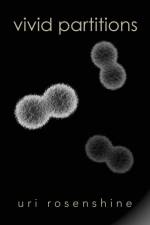av Uri Rosenshine
291
Vivid Partitions is a lyric study of the illusions that separate us from our true selves. It begins with poems that contemplate a lost time of greater intensity and purpose. This meditative phase is broken by an erotic awakening, no less radical for being mingled with a sense of violated solitude. As love grows, so does the competing sense, which attempts to break through the surface of love's illusions, which become still more vivid and possessing, even as the thwarted demand for a restored solitude gets more destructive, threatening a return to the abyss. The animal fables and hushed night-pieces of the latter part of the book evade further conflict and accept what remains unreconciled. As a whole, Vivid Partitions moves toward an acceptance of our separation from our true selves, while also hinting at a path to the truth that spares illusion.n this extraordinary debut, Uri Rosenshine pries open both the beauty and the disintegration of everyday experience. With exceptional poetic precision, he sets out to give things their "due poignancy" and attunes his reader to the sense of being in the midst of a lifetime. Ranging masterfully from the intimate to the speculative, this is poetry that enables you to linger and to see anew what is right in front of you. -Martin Hägglund, Yale University, author of This Life Rosenshine's poems possess an optic at once capacious and dazzlingly acute. They are enrapturing, cutting in their wit, and expansive in their geographies. Taking in the rhododendrons above a lover, tracing everything from shipyards and floating lanterns to different continents and the neuroses of intimates, they illuminate the nightscapes of Chagall and the monads of Leibniz while nodding to that moment of speech that is on the cusp of being. Here is a voice in the process of a brilliant blossoming. -David Francis, Yale University, translator of Footwork: Selected Poems by Severo Sarduy True to its title, Vivid Partitions is the rare work that sharpens our sense of reality by wresting a trove of brilliant images-plants, Stevensian parrots, curios, well-appointed rooms-from the dense fabric of the quotidian and everyday. Rosenshine's poems divulge the "major content" of a young lifetime and give voice anew to the ancient need to live a life of beauty and form. A remarkable first work. -Jensen Suther, Harvard Society of Fellows

